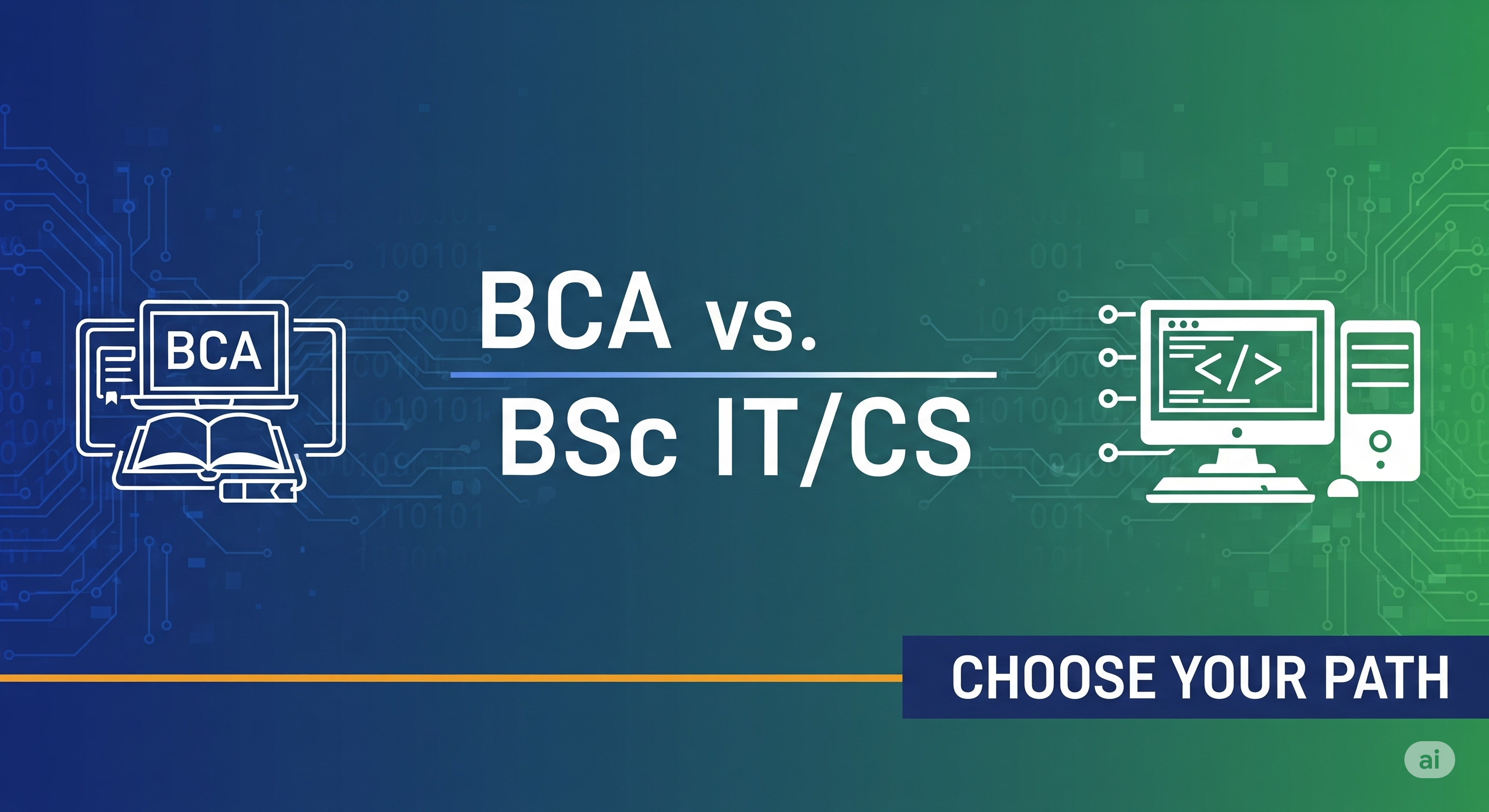BCA vs. BSc IT/CS: Which Degree Gives the Better Career Start?

You’ve finished your 12th standard with a passion for computers. You know you want to build a career in the exciting world of technology, but the path of a B.Tech in Computer Science, with its heavy focus on engineering mathematics and physics, doesn't appeal to you.
You look for alternatives, and two powerful, three-year degree options immediately stand out: the BCA (Bachelor of Computer Applications) and the B.Sc. in Computer Science or Information Technology (B.Sc. CS/IT).
On the surface, they look almost identical. Both are three-year programs, both focus on computers, and both promise a pathway to a job in the IT industry. This creates immense confusion. Is one better than the other? Which degree will give you a better start to your career in terms of job opportunities and salary?
As a career strategist who has counselled thousands of students at this very crossroads, I can tell you that while both are excellent paths, they are designed with fundamentally different philosophies. One is a professional degree focused on application; the other is a science degree focused on theory.
Understanding this core difference is the key to making the smartest choice for your future. Let's do a deep, head-to-head comparison.
Chapter 1: The Core Philosophy - The "Expert Driver" vs. The "Engine Scientist"
The most fundamental difference between a BCA and a B.Sc. CS lies in their core educational philosophy.
The BCA is a Professional Degree (The "Expert Driver"): A Bachelor of Computer Applications is designed with one primary goal: to train skilled and versatile software professionals who are ready for the IT industry. The focus is on the application of computer science.
The Analogy: A BCA program teaches you how to be an expert driver of a high-performance car. You learn how to handle the car in different conditions, how to use all its advanced features, and how to maintain it for peak performance. You become a master of using the technology.
The Approach: The curriculum is practical and hands-on, with a heavy emphasis on programming languages, software development tools, and database management. A top-tier BCA program, like the one at St. Andrews Institute of Technology & Management (SAITM) Gurgaon, is known for its intensely practical, lab-focused curriculum designed to produce job-ready graduates.
The B.Sc. in Computer Science is a Science Degree (The "Engine Scientist"): A Bachelor of Science in Computer Science, on the other hand, is a more traditional academic degree. Its focus is on the fundamental science and theory of computing.
The Analogy: A B.Sc. CS program teaches you the deep physics, chemistry, and engineering principles behind how the car's engine works. You learn about thermodynamics, fuel combustion, and materials science. You understand why the engine behaves the way it does at a fundamental level.
The Approach: The curriculum is more theoretical and mathematically rigorous. It delves deeper into subjects like the Theory of Computation, Analysis of Algorithms, and Discrete Mathematics. A B.Sc. from a college renowned for its strong science faculty, like Asian Business School (ABS) Noida, will have a greater emphasis on these theoretical and mathematical foundations.
Chapter 2: The Curriculum Deep Dive - What Will You Actually Study?
This difference in philosophy is clearly visible in the subjects you will study.
A Typical BCA Syllabus will emphasize:
Programming Languages: Extensive, practical coursework in languages like C, C++, Java, and Python.
Web Development Technologies: Detailed modules on HTML, CSS, JavaScript, and often frameworks like PHP or Node.js.
Database Management: Deep, practical knowledge of SQL and database design with systems like Oracle or MySQL.
Software Engineering: Learning the process of building software, including testing and project management.
Application-focused electives like Mobile App Development, Cloud Computing, or Digital Marketing.
A Typical B.Sc. Computer Science Syllabus will have a greater focus on:
Core Computer Science Theory: Subjects like Theory of Computation, Compiler Design, and Advanced Algorithm Design and Analysis.
Advanced Mathematics: A heavier load of mathematics, including discrete mathematics, linear algebra, and statistical analysis, is often integrated into the curriculum.
Hardware and Architecture: More detailed subjects on Computer Organization & Architecture and Microprocessors.
Scientific and Research-oriented electives like Artificial Intelligence theory, Image Processing, or Cryptography.
While there is overlap, the BCA curriculum is geared towards building software, while the B.Sc. CS curriculum is geared towards understanding the science of computation.
Chapter 3: The First Job & Starting Salary - Who Gets the Better Start?
This is the question that matters most to many students. Which degree will land you a better first job right after graduation?
The BCA's "Job-Ready" Advantage: For entry-level software development and IT services roles, the BCA degree often has a slight edge in industry perception. The name itself—"Computer Applications"—signals to HR managers at large IT services companies (like TCS, Wipro, and Infosys) that this candidate has been trained specifically for practical, application-based roles.
Typical Roles: Software Developer, Web Developer, Software Tester, Technical Support Engineer.
Starting Salary: For a graduate from a good college, this typically falls in the ₹3.5 Lakhs to ₹6 Lakhs per annum range.
The B.Sc. CS/IT Graduate's Path: B.Sc. graduates are, of course, also hired for these same roles. However, they sometimes have to work a little harder in interviews to prove their hands-on application development skills. Their degree is often seen as more "theoretical."
Typical Roles: Software Developer, but also roles that require a slightly more analytical bent like QA Analyst, System Administrator, or Network Support.
Starting Salary: The salary range is very similar to that of a BCA graduate, perhaps with a marginal difference depending on the specific role.
The Verdict for the First Job: For a direct, immediate job in the mainstream IT services industry, the BCA often has a marginal advantage in perception and is seen as a more direct, professional qualification.
Chapter 4: The Path to Higher Studies & Long-Term Growth
The career path doesn't end with the first job. The choice of degree can have a significant impact on your options for higher education, which is the key to long-term growth.
The Path to an MCA (Master of Computer Applications): The MCA is the most popular postgraduate option for both BCA and B.Sc. CS graduates. It is the degree that makes you equivalent to a B.Tech graduate.
Eligibility: Both degrees make you eligible for an MCA.
The B.Sc. Advantage: A B.Sc. Computer Science graduate often has an advantage in cracking the MCA entrance exams (like NIMCET). These exams have a significant weightage for mathematics, a subject that is more deeply covered in the B.Sc. curriculum. They may also find the initial, theory-heavy semesters of the MCA program easier to adapt to. A strong undergraduate foundation from a college like Rayat Bahra University (RBU) Mohali, which is known for its academic discipline, prepares students well for the rigors of these competitive postgraduate entrance exams.
The Path to an M.Sc. or a Research Career: This is where the difference becomes stark.
The B.Sc. Advantage: A B.Sc. in Computer Science is the natural and direct path to an M.Sc. in Computer Science. An M.Sc. from a top university is a gateway to highly specialized roles in core R&D, artificial intelligence research, and academia (becoming a professor). This path is often closed to BCA graduates, as many universities require a B.Sc. for M.Sc. admission.
The BCA Limitation: A BCA is a professional, terminal degree. It is not designed as a stepping stone for a scientific research career.
The Long-Term View: For a student whose ultimate ambition is to work in a cutting-edge research lab or to pursue a PhD in computer science, the B.Sc. CS provides a much stronger and more suitable foundation. For a student whose goal is a mainstream corporate career in software development or IT management, both paths, when combined with a good MCA, lead to the same excellent outcomes.
Conclusion: Which Path Is Right for You?
There is no single "winner" in the battle between BCA and B.Sc. Computer Science. The "better" degree is the one that is a better fit for your brain, your personality, and your long-term ambitions.
You should choose a BCA if:
You love the practical application of computers and want to start building software and websites right away.Your primary goal is to get a good job in the IT industry as fast as possible.
You prefer a hands-on, project-based learning style over deep theoretical study.
You are clear about your "BCA+1" strategy (either an MCA or specialized certifications) for future growth.
You should choose a B.Sc. CS/IT if:
You have a strong interest and aptitude for mathematics and the fundamental science of how computers work.
You are passionate about deep, theoretical concepts like algorithms and computation.
Your long-term ambition includes higher studies (M.Sc. or PhD) or a career in research and development.
You want the option to enter highly analytical fields like core data science or AI research.
One path creates an expert practitioner. The other creates a dedicated scientist. Both are incredibly valuable in the tech world. Choose the one that speaks to you, and you will be on the right path to a successful and fulfilling career.
Note: IndiBlogHub features both user-submitted and editorial content. We do not verify third-party contributions. Read our Disclaimer and Privacy Policyfor details.


